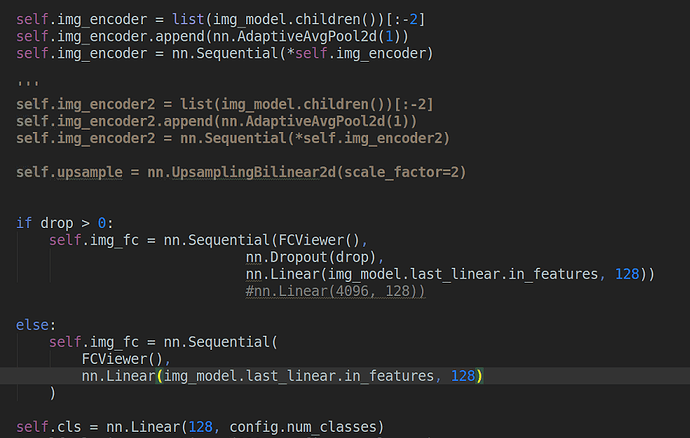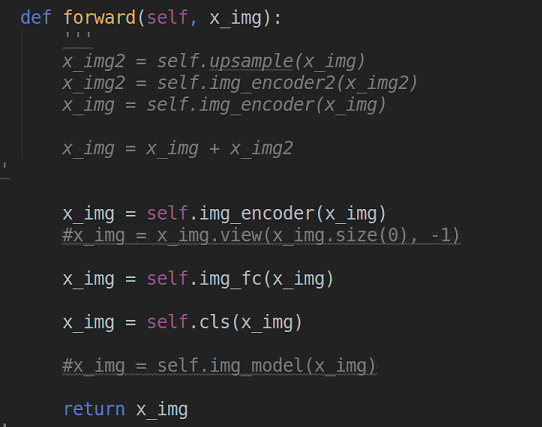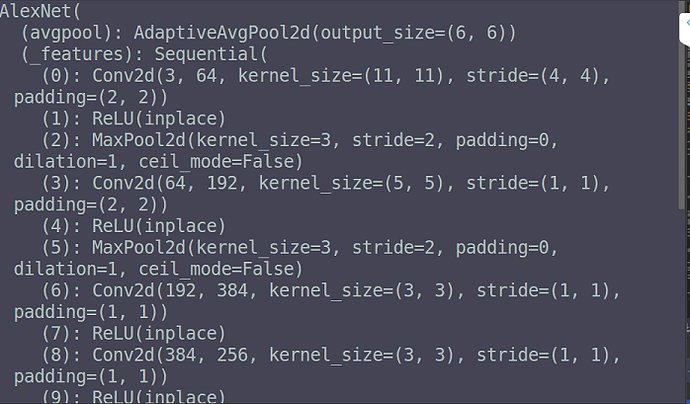Hi, I’m new to pytorch, I have read the pytorch tutorials and doc document, So I try to program some code to test. But there is a error that my “input” doesn’t have the same dimension as tensor for “result”, I’ve tried to change the size of input and reduce the kernel_size but none of them work.
here is my code, I use cifar10 dataset and make a AlexNet model.
import torch.nn as nn
import torch.nn.functional as F
import argparse
import torch
import torch.optim as optim
from torchvision import datasets, transforms
class alexnet(nn.Module):
def __init__(self):
super(alexnet,self).__init__()
self.conv_block1 = nn.Sequential(
nn.Conv2d(3,96,kernel_size=11,stride=4),
nn.ReLU(inplace=True),
nn.MaxPool2d(3,2,ceil_mode=True),
nn.BatchNorm2d(96,affine=False),
)
self.conv_block2 = nn.Sequential(
nn.Conv2d(96,256,kernel_size=11,padding=2,groups=2),
nn.ReLU(inplace=True),
nn.MaxPool2d(3,2,ceil_mode=True),
nn.BatchNorm2d(256,affine=False),
)
self.conv_block3 = nn.Sequential(
nn.Conv2d(256,384,kernel_size=3,padding=1),
nn.ReLU(inplace=True),
)
self.conv_block4 = nn.Sequential(
nn.Conv2d(384,384,kernel_size=3,padding=1,groups=2),
nn.ReLU(inplace=True),
)
self.conv_block5 = nn.Sequential(
nn.Conv2d(384,256,kernel_size=3,padding=1,groups=2),
nn.ReLU(inplace=True),
nn.MaxPool2d(3,2),
)
self.classifier = nn.Sequential(
nn.Linear(6*6*256,4096),
nn.ReLU(True),
nn.Linear(4096,4096),
nn.ReLU(True),
nn.Dropout(),
nn.Linear(4096,10),
)
def forward(self,x):
conv1 = self.conv_block1(x)
conv2 = self.conv_block2(conv1)
conv3 = self.conv_block3(conv2)
conv4 = self.conv_block4(conv3)
conv5 = self.conv_block5(conv4)
score = self.classifier(conv5)
return score
def train(args, model, device, train_loader, optimizer, epoch):
model.train()
for batch_idx, (data, target) in enumerate(train_loader):
data, target = data.to(device), target.to(device)
optimizer.zero_grad()
output = model(data)
loss = F.nll_loss(output, target)
loss.backward()
optimizer.step()
if batch_idx % args.log_interbal == 0:
print('Train Epoch: {} [{}/{} ({:.0f}%)]\tLoss: {:.6f}'.format(
epoch, batch_idx * len(data), len(train_loader.dataset),
100. * batch_idx / len(train_loader), loss.item()
))
def test(args, model, device, test_loader):
model.eval()
test_loss = 0
correct = 0
with torch.no_grad():
for data, target in test_loader:
data, target = data.to(device), target.to(device)
output = model(data)
test_loss += F.nll_loss(output, target, size_average=False).item()
pred = output.max(1, keepdim=True)[1]
correct += pred.eq(target.view_as(pred)).sum().item()
test_loss /= len(test_loader.dataset)
print ('\nTest set: Average loss: {:.4f}, Accuracy: {}/{} (:.0f}%)\n'.format(
test_loss, correct, len(test_loader.dataset),
100. * correct / len(test_loader.dataset)
))
def main():
parser = argparse.ArgumentParser(description='PyTorch AlexNet Try')
parser.add_argument('--batch-size', type=int, default=64, metavar='N',
help='input batch size for training (default: 64)')
parser.add_argument('--test-batch-size', type=int, default=1000, metavar='N',
help='input batch size for testing (default: 1000)')
parser.add_argument('--epochs', type=int, default=10, metavar='N',
help='number of epochs to train (default: 10)')
parser.add_argument('--lr', type=float, default=0.01, metavar='LR',
help='learning rate (default: 0.01)')
parser.add_argument('--momentum', type=float, default=0.5, metavar='M',
help='SGD momentum (default: 0.5)')
parser.add_argument('--seed', type=int, default=1, metavar='S',
help='random seed (default: 1)')
parser.add_argument('--log-interval', type=int, default=10, metavar='N',
help='how many batches to wait before logging training status')
args = parser.parse_args()
if torch.cuda.is_available():
device = torch.device("cuda")
else:
device = torch.device("cpu")
torch.manual_seed(args.seed)
kwargs = {'num_workers': 1, 'pin_memory': True}
transform = transforms.Compose(
[
transforms.ToTensor(),
transforms.Normalize((0.5, 0.5, 0.5), (0.5, 0.5, 0.5)),
])
train_loader = torch.utils.data.DataLoader(
datasets.CIFAR10('./alextry', train=True, download=True,
transform=transform),
batch_size = args.batch_size, shuffle=True, **kwargs
)
test_loader = torch.utils.data.DataLoader(
datasets.CIFAR10('./alextry', train=False, download=True,
transform=transform),
batch_size=args.test_batch_size, shuffle=True, **kwargs
)
model = alexnet().to(device)
optimizer = optim.SGD(model.parameters(), lr = args.lr, momentum=args.momentum)
for epoch in range(1, args.epochs+1):
train(args, model, device, train_loader, optimizer, epoch)
test(args, model, device, test_loader)
if __name__ == '__main__':
main()
thanks for your help




